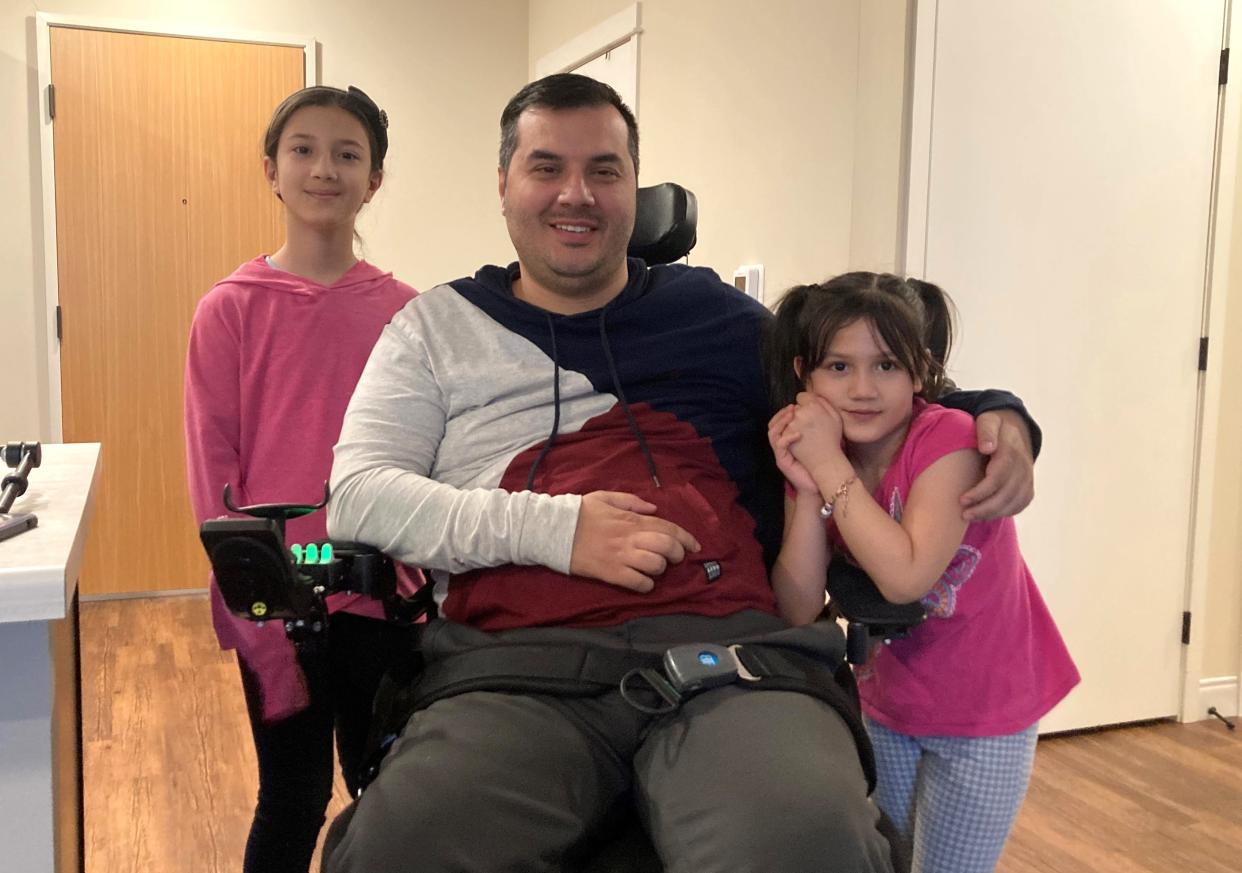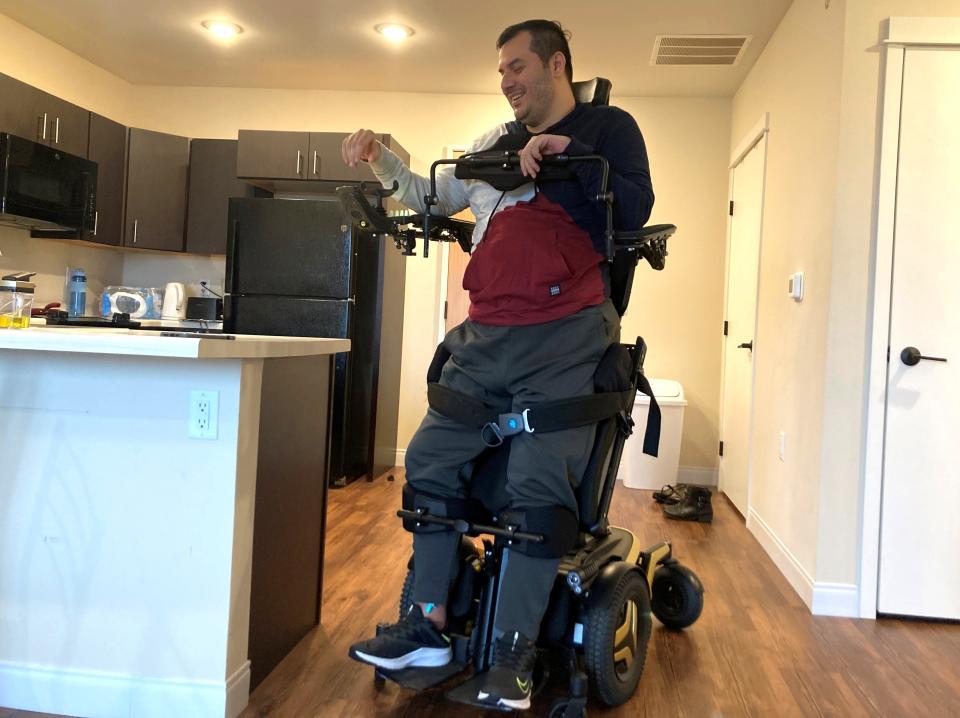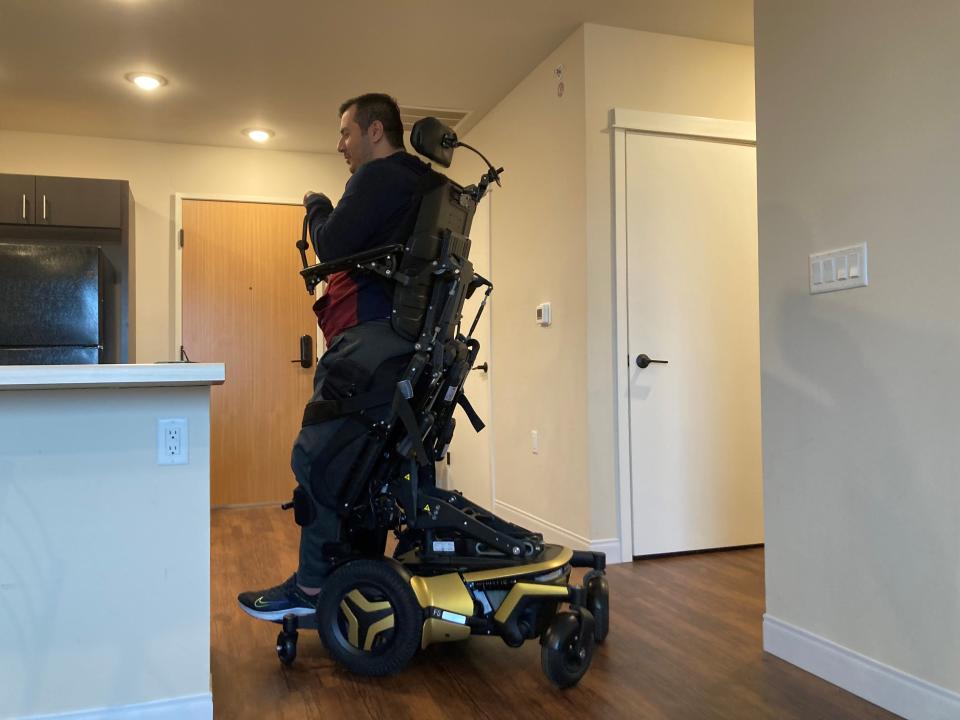'A dream come true for me': A specialized wheelchair has given an Afghan refugee independence, hope

When Arif Faizi's doctors in Milwaukee told him about the top-of-the-line power wheelchair he needed, they asked him to pick out a color for the wheels.
He chose gold, but it felt like an exercise in futility.
The doctors said there was almost no chance insurance would cover the chair. It would move Faizi into a standing position and would reduce painful muscle spasms in his legs, but it cost tens of thousands of dollars.
But then, six months ago, it arrived at his apartment. It was the first time since he was paralyzed in a car crash in Afghanistan in 2018 that he could move around without someone pushing him.
“It was unbelievable,” Faizi said.
Faizi has been relishing his newfound independence, taking trips to the park with his children and catching the bus to the store.
A $10,000 donation from a Milwaukee tech entrepreneur, Kyle Weatherly, made it possible for Faizi's case managers to argue that insurance should cover the chair's remaining price tag.
The wheelchair offers Faizi a fresh start after a difficult journey: He was among the tens of thousands of Afghans who evacuated to the U.S. as the Taliban took over in August 2021. The long hours he spent sitting in his old, basic wheelchair during the evacuation led to serious complications, including a two-month hospital stay once he arrived in Wisconsin.
After crash paralyzed Faizi, Afghanistan offered little accessibility
In 2018, Faizi was 30 years old and running a shop at the NATO base in Kabul. Soldiers bought SIM cards, cell phones, cups of coffee and gifts to take back to their families.
While Fazi was riding in a friend’s car, someone recognized it was a Ministry of Defense vehicle and began shooting at it. The driver lost control and hit a tree.
In the crash, Faizi’s head hit the roof of the car and he broke his neck.
He was paralyzed from the chest down, a spinal cord injury at the C6 and C7 vertebrae.
Life in Afghanistan after the crash was “very difficult,” Faizi said. He had only a basic wheelchair and had lost the grip strength in his hands and arms to push himself around.
He had no access to physical or occupational therapy, and Afghan cities are not wheelchair-accessible, he said.
Faizi’s extended family became his caregivers. It took two people to lift him out of bed, into the bath and back into his chair.
It was an adjustment. Faizi had been a successful businessman: He’d previously owned a home appliance store and a restaurant and traveled internationally for work. Now he found himself running the operations of the NATO base shop through phone calls from home.
A few years later as the Taliban was taking over the country in the summer of 2021, it was clear Faizi would be a target. His brother had also worked as a human resources officer for NATO for five years.
Everyone in the neighborhood knew their affiliations. They had to get out.
The extended family that would flee the country consisted of 21 people – five family units. Among them were Faizi, his wife, Khojesta Faizi, and their three young children.
It was hard to leave, and the children – ages 9, 7 and 4 – miss Afghanistan and the relatives they left behind. Faizi does too.
But the U.S. provides a chance at a new life they never could’ve had in their home country, he said.
“We feel safe here, we are very happy to be here,” Faizi said. “The opportunity that we have, we are very thankful to God.”
If they’d stayed, his daughters Hafsa and Salwa couldn’t have gotten an education. In Milwaukee, the girls love their school and have made good friends.
“Now that they are here and they are studying, we are thinking that they have a bright future,” Faizi said.

Pressure wound leads to lengthy hospital stay
Faizi’s optimism today comes a year and a half after the family’s evacuation, in which he suffered a pressure wound so severe that he was immediately admitted to the hospital upon arriving at Fort McCoy in northern Wisconsin.
Faizi had developed the wound on his back from sitting in his wheelchair for dozens of hours at a time throughout the days-long evacuation ordeal.
Hospital staff cleaned the open wound and told him his blood was infected. They hooked what’s called a vacuum-assisted closure device to his back to heal the wound.
The machine didn’t allow him to sit up or lie on his back, only on his side. For two and a half months, Faizi lay in the Sparta hospital.
His wife stayed with him, and his mother cared for their children at Fort McCoy.
They especially missed their son, who was just 3 years old at the time.
“Spending time in (the) hospital is awful, always,” Faizi said.
Even once he was released from the hospital, Faizi had to spend the better part of the next five months lying on his side.
Connection between UW regents prompts donation
As the family was waiting to be resettled, Mary Flynn, the refugee program manager for Lutheran Social Services in Milwaukee, began making plans to welcome them.
Knowing that Faizi’s relatives were his caregivers, Flynn and her staff looked for somewhere that could house all five family units but couldn’t find anything suitable that could also accommodate a wheelchair.
“There’s not a lot of ADA-accessible apartments that were even close to affordable,” Flynn said.
Eventually, they got Faizi and his family into a building with an elevator on Milwaukee’s south side that’s managed by LSS. His parents live in a unit upstairs. His other relatives live in a duplex on North 68th Street.
As Flynn was preparing for Faizi’s arrival, the entrepreneur Weatherly was searching for a way to directly help an Afghan evacuee family.
He’d been moved by the images of the chaotic evacuation in Kabul. One day, he was having dinner with Héctor Colón, the president and chief executive of Lutheran Social Services in Milwaukee. The two are on the University of Wisconsin System Board of Regents together.
Weatherly asked Colón about donating money to help one family instead of a general donation.
Colón took the question to Flynn, and she instantly thought of Faizi and the specialized wheelchair he needed, but insurance likely wouldn’t cover.
Weatherly “was just coming with an open heart and an open mind, and he had no preconceived notions or conditions on this donation at all,” Flynn said.
He was glad to find out his money would go toward Faizi and his family, who worked with U.S. forces in Afghanistan.
“We have a moral obligation to do everything to make sure his family is not only settled in the U.S., but has an opportunity to become fully part of the American story,” Weatherly said.
With Weatherly’s $10,000 pledge and persistence from LSS staff, the insurance company agreed to cover the rest of the cost of the motorized chair.
When Faizi finally learned he’d get the wheelchair he needed, he told his physical therapist – who didn’t believe him at first. She only knew of a few people who’d ever been approved for the wheelchair with the standing function.
“The donor money really seemed to be the key,” Flynn said. “It was a really great piece of teamwork.”

Faizi enjoys newfound independence in wheelchair
The power wheelchair gives Faizi a sense of independence he’d been missing since the car crash.
Transferring into bed, the bath and the car are much easier now with this chair, which does the lion's share of the lifting, instead of his relatives.
And he can punch the button to move into a standing position several times per day, helping relieve the muscle spasms and regulate his low blood pressure.
He’s learned how to ride Milwaukee County buses to Walmart and to appointments. He cherishes when his kids hop on his lap and they motor down the block to the playground.
When he sits at home for too long, “bad thoughts” intrude, Faizi said. “When I go out, I feel very good.”
And through the physical and occupational therapy he’s received in Milwaukee, he’s gained more strength and control in his arms.
Among the small joys Faizi now appreciates: popping into the kitchen to check what his wife, Khojesta, is cooking for dinner.
“For me, life is much easier here than Afghanistan,” he said. “We are very, very thankful for that.”
Faizi’s English skills mean that LSS has tapped him for over-the-phone interpretation services, a good way for him to earn money from home. He and agency staff are now looking into what it would take to become a certified legal and medical interpreter.
And Khojesta, who studied sharia law in Afghanistan, is now a community health worker for Ascension and is exploring new career paths. She hopes to earn a master's degree.
One evening in January, Faizi and Weatherly got to meet. Talking with the family about their hopes and dreams over a spread of Afghan dishes, Weatherly was moved.
It was unexpectedly emotional “to see how much they embraced the opportunity that was in front of them,” he said.
From Flynn’s perspective, Faizi’s story of hard work and perseverance is classic among refugees.
Outsiders might see refugee resettlement as simply giving people money and “doing things for them,” Flynn said. But it’s about “helping someone get connected to the resources that they need, and then stepping back.”
“Donations give that step up,” she said. “They don't replace an individual’s motivation to have a better life. They just sometimes need a little extra help. And that was the case with Arif.”
Flynn’s next hope is that someone would help purchase a wheelchair-accessible van so Faizi can take his motorized wheelchair on outings without having to rely on the bus. The family’s Honda Pilot doesn’t fit the new chair.
And Faizi’s hope is to walk again one day. For now, he’s continuing to gain independence in his wheelchair.
“It’s a dream come true for me,” he said. “I’m very, very happy.”
This article originally appeared on Milwaukee Journal Sentinel: Paralyzed Afghan evacuee receives motorized wheelchair in Milwaukee

